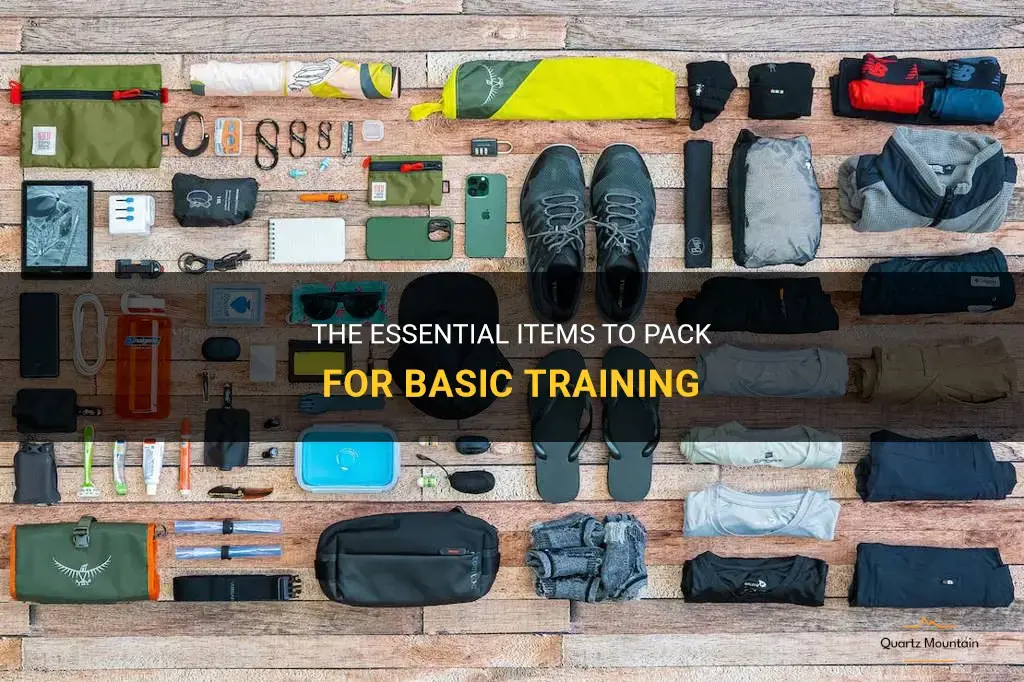
Basic training is an intense and challenging experience that every military recruit must go through. During this time, recruits are pushed to their physical and mental limits, and it is crucial to be prepared with the essential items in order to succeed. In this guide, we will cover the top items that every recruit should pack for basic training to ensure a smooth and successful journey through this rigorous training program. From durable clothing to essential hygiene products, these items will not only help recruits survive but also thrive during this demanding period of military training. So, if you are about to embark on your basic training journey or know someone who is, stay tuned for our comprehensive list of the must-have essentials you need to pack for basic training.
What You'll Learn
- What are the essential items that recruits should pack for basic training?
- Are there any specific clothing items or uniforms that are required for basic training?
- Is there a limit on the number and size of personal items recruits can bring to basic training?
- Are there any personal hygiene products that recruits should pack for basic training?
- Are there any items that recruits should avoid packing for basic training?

What are the essential items that recruits should pack for basic training?
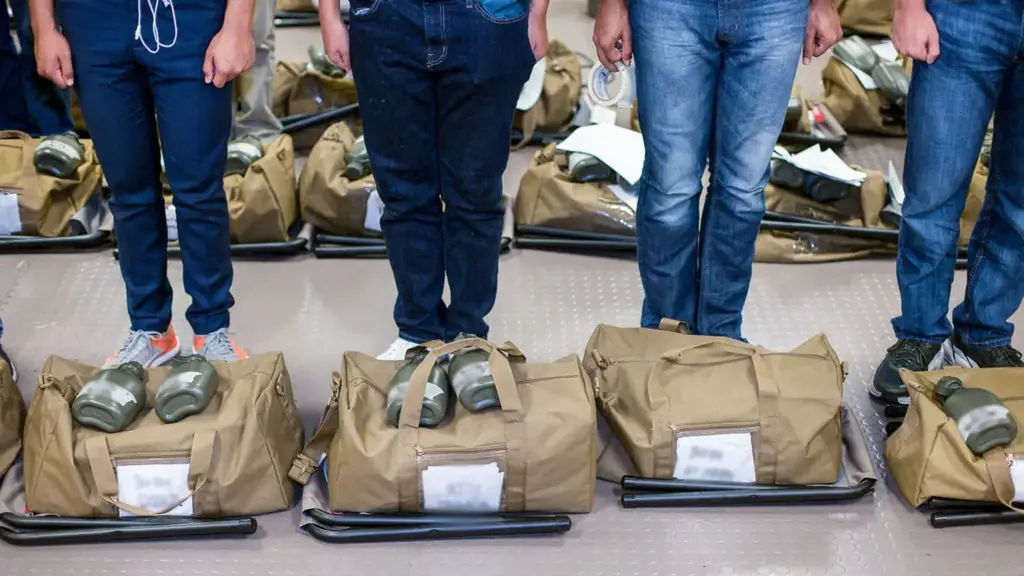
When recruits prepare for basic training, it is crucial for them to pack the essential items to ensure they have everything they need during their training. Basic training can be physically and mentally demanding, so having the right equipment and personal items can make the experience more manageable. In this article, we will discuss the essential items recruits should pack for basic training.
Clothing:
- Underwear: Pack enough underwear to last for the duration of the training.
- Socks: Bring several pairs of comfortable socks to prevent blisters and discomfort.
- T-shirts: Opt for moisture-wicking and breathable fabric for t-shirts.
- Training shorts/pants: Choose lightweight and durable shorts or pants for physical training sessions.
- Running shoes: Invest in a good pair of running shoes for physical activities.
Hygiene and personal care items:
- Toothbrush and toothpaste: Maintain oral hygiene with a toothbrush and toothpaste.
- Soap and shampoo: Bring travel-sized containers of these items for showering.
- Deodorant: Stay fresh throughout the training with a reliable deodorant.
- Razor: Pack a razor if you prefer to shave regularly.
- Feminine hygiene products: Female recruits should pack an adequate supply of feminine hygiene products.
- Medications: If you require any prescription medications, bring enough for the entire training period.
Bedding and accessories:
- Pillow and pillowcase: Adding a personal touch, along with comfort, to your bunk.
- Sheets and blankets: Bring sheets and a warm blanket for a good night's sleep.
- Laundry bag: Keep your dirty clothes separate from clean ones with a laundry bag.
- Towels: Bring both bath towels and smaller towels for showering and other activities.
Miscellaneous items:
- Phone and charger: Although phone usage may be limited, having it for emergencies is essential.
- Photo of loved ones: Bring a small photo to have some familiar faces during challenging times.
- Pen and paper: Useful for taking notes, writing letters, or jotting down important information.
- Earplugs: In case you are sensitive to noise or have trouble sleeping with background sounds.
- Watch: A watch can help you keep track of time during training activities.
Important documents:
- Identification cards: Carry your government-issued identification cards or driver's license.
- Social security card: Some paperwork may require your social security number.
- Bank account information: If you have direct deposit, bring the necessary bank account details.
It is important to note that recruits should consult their relevant military branches for specific guidelines on what is allowed and prohibited during basic training. Each branch may have different rules and regulations regarding personal items.
In conclusion, packing the essential items for basic training can significantly contribute to a recruit's overall experience. By considering clothing, hygiene and personal care items, bedding and accessories, miscellaneous items, and important documents, recruits can ensure they have what they need to navigate through the physical and mental demands of basic training.
Essential Items to Pack for Your Child's First Day of Kindergarten
You may want to see also

Are there any specific clothing items or uniforms that are required for basic training?
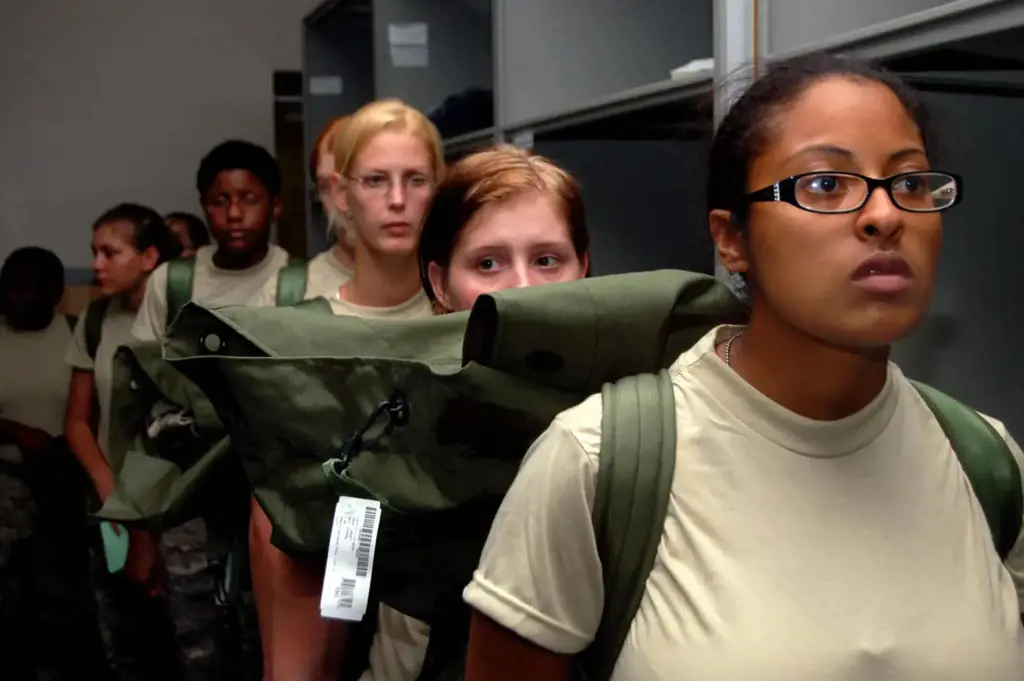
When it comes to basic training in the military, there are specific clothing items and uniforms that are required. These items are necessary for maintaining a professional appearance and ensuring the safety and functionality of the trainees. In this article, we will discuss some of the clothing items and uniforms commonly required for basic training.
One of the most important clothing items for basic training is the physical training (PT) uniform. This typically consists of a t-shirt, shorts or sweatpants, and athletic shoes. The PT uniform is worn during physical fitness training and is designed to provide comfort and freedom of movement. Trainees are often required to have multiple sets of PT uniforms to allow for regular washing.
In addition to the PT uniform, trainees are also provided with a utility uniform for daily wear. This uniform usually consists of a camouflage patterned shirt and pants, along with a belt and boots. The utility uniform is intended to be worn during training exercises and other daily activities. Trainees are expected to keep their utility uniforms clean and well-maintained.
Another important clothing item for basic training is the dress uniform. This uniform is typically worn for special occasions and formal events. It includes a dress jacket, trousers or skirt, a dress shirt or blouse, and various accessories such as a belt, tie, and ribbons. Trainees are expected to take great care in ensuring that their dress uniforms are properly pressed and presented.
In addition to these specific clothing items, trainees are also required to have a variety of undergarments, such as socks and underwear, as well as personal hygiene items like soap, shampoo, and toothpaste. These items are essential for maintaining personal cleanliness and uphold high standards of hygiene.
It is worth noting that the specific clothing items and uniforms required for basic training may vary depending on the branch of the military and the specific training program. It is important for trainees to consult with their commanding officers or training staff to ensure they have the correct clothing items and uniforms.
In conclusion, basic training in the military requires trainees to have specific clothing items and uniforms. These items are necessary for maintaining a professional appearance and ensuring the safety and functionality of the trainees. Whether it is the PT uniform, utility uniform, or dress uniform, trainees must take care in ensuring their clothing is clean, well-maintained, and properly presented. By following these requirements, trainees can contribute to a successful training experience.
Essential Items for a September Trip to Greece: What to Pack
You may want to see also

Is there a limit on the number and size of personal items recruits can bring to basic training?
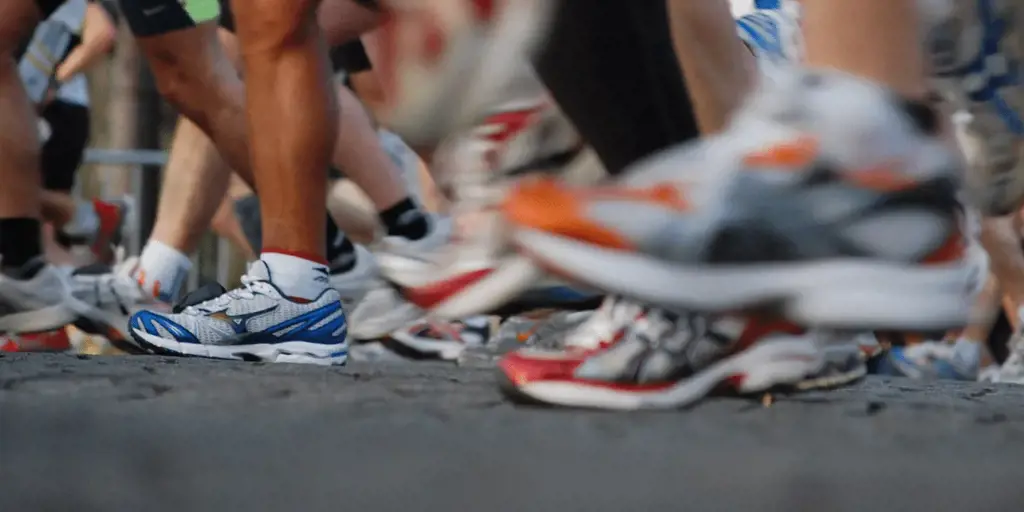
Yes, there is a limit on the number and size of personal items that recruits can bring to basic training in the military. These limits are put in place to ensure that recruits are able to complete their training without unnecessary distractions or clutter.
When recruits arrive at basic training, they are typically issued a list of authorized personal items that they are allowed to bring with them. This list may vary depending on the branch of the military and the specific training program, but it generally includes essentials such as toiletries, underwear, socks, and a few changes of clothing.
Recruits are typically advised to bring only what is absolutely necessary, as they will have limited storage space in their barracks. This means that they will need to carefully consider which personal items they choose to bring with them.
In addition to the number of personal items, there are also limits on the size of these items. For example, recruits may be limited to a certain size of duffel bag or backpack for their clothing and personal belongings. This ensures that everyone has an equal amount of storage space and that the barracks do not become overcrowded.
Some personal items, such as electronics or personal mementos, may be restricted or prohibited altogether. This is to prevent distractions and to ensure that recruits are fully focused on their training.
While the limits on personal items may seem restrictive, they serve an important purpose. Basic training is designed to be intensive and demanding, both physically and mentally. By minimizing the number and size of personal items, recruits are able to focus more fully on their training and the tasks at hand.
There are several benefits to limiting the number and size of personal items at basic training. First, it helps recruits learn to prioritize and streamline their belongings, which is an important skill in the military. Second, it reduces clutter and maintains a sense of organization in the barracks. Finally, it creates a more uniform and cohesive environment, fostering a sense of unity and teamwork among the recruits.
In conclusion, there is indeed a limit on the number and size of personal items that recruits can bring to basic training. These limits are in place to minimize distractions, maximize space, and promote a sense of unity among the recruits. While they may seem strict, they serve an important purpose in preparing new recruits for the rigors of military service.
Essential Items to Pack for an October Trip to Egypt
You may want to see also

Are there any personal hygiene products that recruits should pack for basic training?
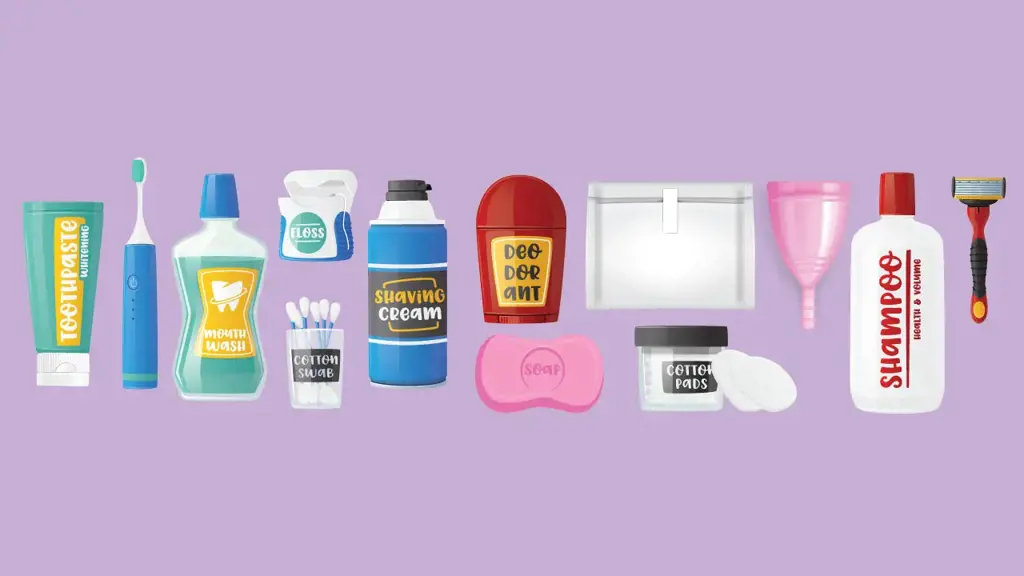
When it comes to basic training in the military, personal hygiene is of utmost importance. Recruits are expected to maintain high levels of cleanliness and grooming to ensure the health and well-being of themselves and their fellow trainees. While basic training provides recruits with some personal hygiene products, there are a few items they should consider packing to make their experience more comfortable. In this article, we will discuss some personal hygiene products that recruits may find valuable during basic training.
- Toothbrush and toothpaste: Good oral hygiene is essential, and recruits should bring their own toothbrush and toothpaste. It is important to brush teeth regularly to prevent dental problems and maintain fresh breath.
- Deodorant: The physical nature of basic training can lead to sweat and body odor. Bringing a strong, long-lasting deodorant can help keep recruits feeling fresh and odor-free throughout the day.
- Soap and shampoo: Basic training typically provides recruits with a bar of soap and a small bottle of shampoo. However, some recruits may prefer to bring their own soap and shampoo, as personal preferences vary.
- Razor and shaving cream: Many military branches require recruits to be clean-shaven. Bringing their own razor and shaving cream can ensure recruits have the necessary tools to maintain a clean and neat appearance.
- Feminine hygiene products: Female recruits should bring an adequate supply of feminine hygiene products, such as pads or tampons, to last through the duration of basic training.
- Nail clippers and file: Keeping nails clean and trimmed is important for personal hygiene and preventing infections. Recruits should bring nail clippers and a file to maintain their nails during basic training.
- Cotton swabs and cotton balls: These items have multiple uses, such as cleaning ears or applying ointments or creams. They can come in handy during basic training.
- Sunscreen: Basic training often involves spending long hours outdoors, sometimes under intense sunlight. Bringing sunscreen is essential to protect the skin from harmful UV rays and prevent sunburn.
- Lip balm: Recruits may experience dry and chapped lips due to the harsh environmental conditions during basic training. Having a lip balm can help moisturize and protect the lips.
- Moisturizer: The physical demands of basic training can put a toll on the skin. Bringing a moisturizer can help keep the skin hydrated and prevent dryness and irritation.
It is important to note that recruits should check with their specific military branch or training center for any restrictions or guidelines on personal hygiene products. Additionally, recruits should pack these items in accordance with the guidelines provided by their training center, as space may be limited.
In conclusion, while basic training provides recruits with some personal hygiene products, there are a few items they may find valuable to bring for their comfort. These include a toothbrush and toothpaste, deodorant, soap and shampoo, razor and shaving cream, feminine hygiene products, nail clippers and file, cotton swabs and balls, sunscreen, lip balm, and moisturizer. By packing these essential items, recruits can maintain good hygiene and overall well-being throughout their basic training experience.
The Ultimate Packing Checklist for Your Trip to Brazil
You may want to see also

Are there any items that recruits should avoid packing for basic training?
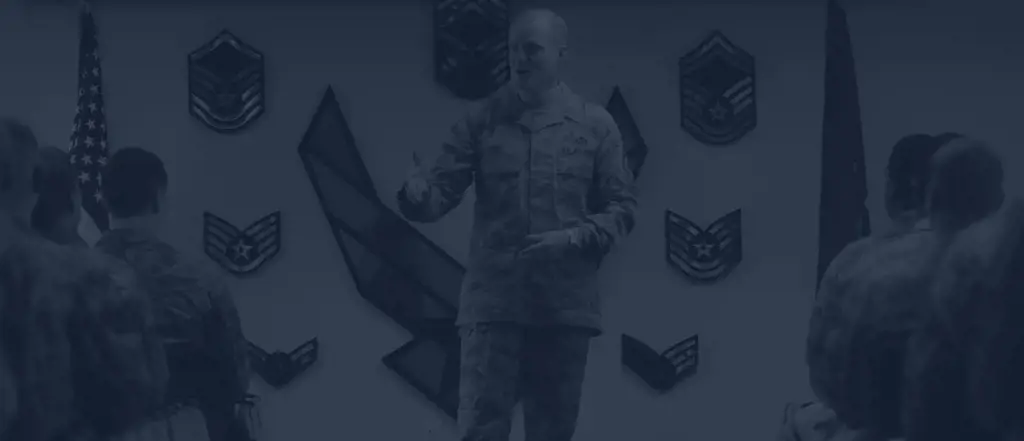
When it comes to packing for basic training, it's important for recruits to keep in mind that space is limited and there are certain items they should avoid bringing. While it may be tempting to pack everything they think they might need, it's essential to remember that basic training is designed to strip recruits down to the essentials and prepare them for military life. Here are some items that recruits should avoid packing for basic training:
- Electronic devices: Recruits should leave behind their cell phones, laptops, tablets, and other electronic devices. Basic training is a time for recruits to focus solely on their training and not be distracted by technology. Additionally, these devices can be easily lost or damaged during the rigorous activities of basic training.
- Non-military clothing: Recruits should only bring the clothing that is required for basic training. This typically includes underwear, socks, t-shirts, athletic shorts, and running shoes. Bringing additional civilian clothing is unnecessary and will only take up valuable space in their duffel bag.
- Excessive personal items: Recruits should avoid bringing too many personal items such as photographs, jewelry, or sentimental objects. Basic training is a time when recruits need to focus on their training and not be distracted by personal belongings. In addition, these items can easily get lost or stolen in the communal living environment of basic training.
- Non-regulation toiletries: Recruits should only bring the toiletries that are specifically listed on their packing list. This typically includes items such as toothbrush, toothpaste, shampoo, soap, and razor. Bringing additional, non-regulation toiletries is unnecessary and will only take up precious space in their duffel bag.
- Non-required paperwork: Recruits should only bring the paperwork that is required for basic training. This typically includes their identification documents, medical records, and any necessary paperwork provided by their recruiter. Bringing additional paperwork or personal documents is unnecessary and will only add to the confusion and disorganization of basic training.
It's important for recruits to understand that basic training is a time for them to focus on their training and prepare for their military career. By avoiding packing unnecessary items, recruits can ensure that they have the space and resources they need to succeed in basic training. A clutter-free and well-organized duffel bag will make it easier for them to locate and access their essential items, and reduce the risk of losing or misplacing anything during the demanding activities of basic training.
In conclusion, recruits should avoid packing items such as electronic devices, non-military clothing, excessive personal items, non-regulation toiletries, and non-required paperwork for basic training. By doing so, they can focus on their training and ensure that they have the space and resources they need to succeed in basic training.
Essential Items for a Mediterranean Cruise in May
You may want to see also
Frequently asked questions
When packing for basic training, it's important to remember that space is limited, so only bring the essentials. You'll need items like underwear, socks, and comfortable athletic clothing. It's also recommended to pack a personal hygiene kit with items like toothbrush, toothpaste, shampoo, and soap. Lastly, don't forget any necessary medication or prescription glasses.
There are a few special items that may be helpful during basic training. One item is a small notebook and pen to take notes or write down important information. Another helpful item is a watch with a stopwatch function, as you'll likely have timed exercises. Additionally, some recruits find it helpful to bring a small portable fan or a neck cooling towel to help beat the heat.
In most cases, you will not be allowed to bring cell phones or other electronic devices to basic training. The military wants to create an environment focused on training and eliminating distractions. However, you may be able to use personal electronic devices during designated personal time, but this is dependent on the policies of your specific branch of the military.
It's recommended to pack comfortable athletic clothing for basic training. This includes items like t-shirts, shorts, athletic pants, and running shoes. Make sure your clothing is light and breathable to help keep you cool during physical training. Avoid packing any clothing with offensive slogans or graphic designs.
Bringing personal items for motivation can be a great idea, as basic training can be mentally and physically challenging. Some recruits bring pictures of loved ones or small mementos to remind them of home. However, it's important to remember that space is limited, so only bring a few small items that hold significant meaning to you.







